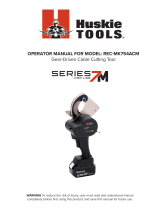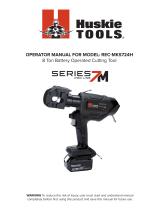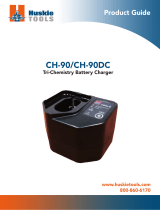Page is loading ...

WARNING To reduce the risk of injury, user must read and understand manual
completely before first using this product and save this manual for future use.
OPERATOR MANUAL FOR MODEL: RCC-MK754ACM
Remote Controlled Gear-Driven Cable Cutting Tool

THIS PAGE
INTENTIONALLY
LEFT BLANK

MODEL: RCC-MK754ACM
TABLE OF CONTENTS
Specifications ................................................................................................................................ 4
Safety Symbols.............................................................................................................................. 5
Safety Information......................................................................................................................... 6
Operating Instructions ...............................................................................................................8 - 9
Troubleshooting Guide ................................................................................................................. 11
Maintenance Notes ..................................................................... ................................................. 13
Warranty Information .................................................................................................................... 12
THANK YOU for purchasing a Huskie Tools product. Our mission is to supply the
finest cable connecting and cutting tools and cable-related products to the transmission
and distribution markets. Huskie Tools products will represent state-of-the-art tools and be
dependable and safe.
FCC Advisory .................................................................................................................................7
Battery and Charger use and care................................................................................................ 10

4
MODEL: RCC-MK754ACM
SPECIFICATIONS
Specifications
Length...............................................7.0" (178 mm)
Width .................................................. 4.5” (114 mm)
Height ..............................................17.5” (445mm)
Weight ............................................. 8.15 lbs. (3.7kg)
Cutting Capacities
ACSR .................................................DO NOT CUT
Aluminum .............................................. 1500 MCM
Copper .................................................. 1000 MCM
Safety features
Tool can only be
used as a remote
cutter; there is no
trigger on tool.
Gear-Drive blade
design ensures only
the desired cable is
cut.
Grounding Stud for
extra safety should
cable not be
discharged—fits
multiple clamp styles
LED lights on tool for
power, pairing and
blade engagement
for safe tool set up
and operation
Remote Operation
increases safety
Encrypted signal is
uniquely paired with
tool to prevent ability
of powering a
different tool
Radio Frequency
signal not affected
by obstructions
Two-button
operations prevents
inadvertent tool
activation
LED lights confirm
complete cut
ensuring safe
operation methods
•Tool can only be used as a remote cutter; there is no trigger on
tool.
•Gear-Drive blade design ensures only the desired cable is cut.
•Grounding Stud for extra safety should cable not be discharged—
fits multiple clamp styles
•LED lights on tool for power, pairing and blade engagement for
safe tool set up and operation
•Remote Operation increases safety
•Encrypted signal is uniquely paired with tool to prevent ability of
powering a different tool
•Radio Frequency signal not affected by obstructions
•Two-button operations prevents inadvertent tool activation
•LED lights confirm complete cut ensuring safe operation methods
Maximum cable diameter of 2 1/8"

5
MODEL: RCC-MK754ACM
SAFETY SYMBOLS
Read all instructions and
safety information detailed
in this operator manual prior
to operating or servicing
this tool. Failure to observe
this warning could result
in severe injury or death.
Do not discard this product or throw away!
For recycling information, contact
800-822-8837
You will see this symbol throughout this manual.
This purpose of this symbol is to call your attention
to hazards and/or unsafe practices that have the
potential to cause injury or property damage. The
severity of each hazard is further explained in detail
below. Failure to follow all instructions may result in
electric shock, fire and/or serious injury. The term
“power tool” in all warnings refers to your battery
operated (cordless) power tool.

6
MODEL: RCC-MK754ACM
Work Area Safety
• Keep work area clean and well lit. Cluttered or dark areas invite accidents.
• Do not operate power tools in explosive atmospheres, such as in the presence of flammable liquids,
gases or dust. Power tools create sparks which may ignite the dust or fumes.
• Keep bystanders away while operating a power tool. Distractions can cause you to lose control.
Personal Safety
• Stay alert, watch what you are doing and use common sense when operating a power tool. Do
not use a power tool while you are tired or under the influence of drugs, alcohol or medication. A
moment of distraction while operating power tools may result in personal injury.
• Use personal protection equipment. Always wear eye protection. Safety equipment such as dust
mask, non-skid safety shoes, hard hat, or hearing protection used for appropriate conditions will
reduce personal injuries.
• Do not overreach. Keep proper footing and balance at all times. This enables better control of the
power tool in unexpected situations.
Tool Use and Care
• To prevent leakage, overheating, smoke generation, fire, and rupturing from occurring, follow these instructions when handling
our rechargeable power tools (tool main body/battery pack/charger).
• Do not force the tool. Use the correct tool for your application. The correct tool will do the job better and safer at the rate for
which it was designed.
• Do not use the tool if the switch does not turn it on and o. Any tool that cannot be controlled with the switch is dangerous and
must be repaired.
• Disconnect the battery pack from the tool before making any adjustments, changing accessories, or storing. Such preventive
safety measures reduce the risk of starting the tool accidentally.
• Store idle tools out of the reach of children and do not allow persons unfamiliar with the tool or these instructions to operate the
tool. These tools can be dangerous in the hands of untrained users.
• Maintain tools. Check for misalignment or binding of moving parts, breakage of parts and any other condition that may aect the
tools operation. If damaged, have the tool repaired before use.
• Use power tools only with specifically designated battery packs. Use of any other battery packs may create a risk of injury and
fire.
• Under abusive conditions, liquid may be ejected from battery; avoid contact. If contact accidentally occurs, flush with water. If
liquid contacts eyes, additionally seek medical help. Liquid ejected from the battery may cause irritation or burns.
SAFETY INFORMATION

Advisory: FCC RF Exposure Compliance
The RCC-MK754AC tool and remote contain FCC ID: MCQ-XBEE3. IC: 1846A-XBEE3
This device complies with Part 15 of the FCC Rules. Operation is subject to the following two conditions:
(1.) This device may not cause harmful interference and
(2.) This device must accept any interference received, including interference that may cause undesired
operation.
PORTABLE DEVICE DESIGNED ONLY FOR OCCUPATIONAL USE
Caution: Device must be restricted to occupational use. See tool use instructions that follow for specific
operating
requirements. This advisory and its information is required for FCC RF exposure compliance.”
Tool Use Instructions: How to use the device in order to ensure compliance with the occupational/controlled
exposure limits.
Maintain hands and fingers a minimum distance of
20mm from the device antenna. Antenna shown.
Power ON remote – check devise connection LED is
on.
Hold Activation Buttons until the Blade Engaged
LED turns out. Typical time required is 12-15
seconds.
Power OFF remote – before approaching the tool.
MODEL: RCC-MK754ACM
7

Copyright © Huskie Tools 2019
MODEL: RCC-MK754ACM
If necessary, use the rigging points on the tool to secure it from falling after the cut is made. The tool
has several options for rigging depending on application. The kit will include hanging rings for proper
rigging.
OPERATING INSTRUCTIONS
1. Position, Rig, and Ground
Secure the blade around the cable to be cut and make sure the blade engagement lever is secured.
To secure the lever, pull down lever as shown and move blade into pinion gear. Release once blade
stops.
Grounding stud is provided. Attach the stud to pivot bolt as shown and adjust angle to avoid
interference with the cable. Lock the position of the stud in place by tightening the lock nut.
8

MODEL: RCC-MK754ACM
At this point, operator can safely remove themselves from the area or line of sight with the tool for actual
operation. This will be up to each company for their own policy and procedures for remote cutting.
On the remote hand-held device, turn power switch to “ON” position. Confirm “power”, “blade engage” and
“paired” LED’s are all illuminated.
To operate the tool to cut, press both buttons on the remote – no sequence is needed, as long as both
buttons are pressed, the tool will operate. The tool with stop when one or both buttons are released.
The operator will know the cable is cut when the yellow “blade engaged” LED is off – this indicates the
blade has completely gone through its arc and out the other side, leaving no chance the cable has not
been cut. If LED is still illuminated, the blade has stopped, and cable is not cut. Cycle time should be
approximately 15 to 20 seconds.
9
OPERATING INSTRUCTIONS
2. Power ON
Once tool is secured and blade is engaged, press the power switch "ON". the Green power LED and
Yellow blade engage LED will illuminate. Then press the "CUT" switch. The tool automatically goes to
the "OPEN" position each time it is powered up for safety.
Once the hand held remote is powered on, the blue "paired" LED
will illuminate.
Be sure to check battery levels on both the tool and remote before
operating.
Blade engage (yellow) and Pairing (blue) LED lights
3. Operate
Device Paired (blue)
Battery low (red)
Blade engaged (yellow)

10
MODEL: RCC-MK754ACM
Battery and Charger Use and Care
•Before using battery charger, read all instructions and cautionary markings on battery charger,
battery pack, and product using battery pack.
•To reduce the risk of injury, charge only approved Makita batteries specified in manual. Other
types of batteries may burst causing personal injury and damage.
•Do not leave charger and battery pack exposed to rain or snow, submerge in water, or stored in
damp or wet locations.
•To reduce risk of damaging the electric plug and cord, pull by plug rather than cord when
disconnecting charger.
•Make sure cord is located so that it will not be stepped on, tripped over, or otherwise subjected to
damage or stress.
•Do not disassemble charger or battery pack, contact Huskie Tools service dept. at 800-860-6170
when service or repair is required. Incorrect reassembly may result in a risk of electric shock or fire.
•Do not store the tool and battery pack in locations where the temperature may reach or exceed 50°
C (122°F) (such as a metal tool shed, or a car in the summer), which can lead to deterioration of the
storage battery.
•Do not charge battery pack when the temperature is BELOW 0°C (32°F) or ABOVE 40°C (104°F).
This is very important to maintain optimal condition of the battery pack.
•The charger is designed to operate on standard 120V AC electrical power only. Do not attempt to
use it on any other voltage.
•Charge the battery pack in a well-ventilated place, do not cover the charger and battery pack with
a cloth, etc., while charging.
•Use of an attachment not recommended may result in a risk of fire, electric shock, or personal
injury.
•Do not short the battery pack or allow metal objects to touch the terminals. A battery short can
cause a large current flow, overheating and create the risk of fire or personal injury.
•Huskie Tools is not responsible for any damage or accident caused by the use of recycled or
counterfeit battery pack.
•Do not incinerate the battery pack or dispose of the battery pack in a fire or expose it to excessive
heat.
•Do not charge the battery pack in a high-temperature location, such as next to a fire or in direct
sunlight. Otherwise, the battery may overheat, catch fire, or explode.
•After removing the battery pack from the tool or the charger, always re-attach the pack cover.
Otherwise, the battery contacts could be shorted, leading to a risk of fire.
•When the Battery Pack Has Deteriorated, Replace It with a New One. Continued use of a
damaged battery pack may result in heat generation, ignition or battery rupture.
•When storing, remove any material cuttings and dust from the battery pack, and place the battery
pack separately from metal objects (screws, nails, etc.) when storing in the tool case.

11
MODEL: RCC-MK754ACM
TROUBLESHOOTING GUIDE
Before You Begin
1. Make sure that the battery is charged. Recheck the battery LED charge level after several
minutes to make sure the battery is sufficiently charged.
2. Check the yellow pairing number on the tool and remote to be sure the correct remote and tool
are properly matched for operation.
3. Check the tool and remote for any signs of damage or loose or missing parts prior to operation.
Please refer to factory service technicians for any questions with repair and service of this
product.
PROBLEM CAUSE SOLUTION
Motor runs but the tool
blades will not advance
Blade is not engaged with
pinion gear
Check and engage blade
Pinion gear or blade is broken Consult factory for repair service
Defective gearbox Consult factory for repair service
Consult factory for repair service
Consult factory for repair service
Motor will not run at all Defective battery
Replace battery
Bad contact or loose
battery connections
Check all connections and wires
Malfunction of switch panel Check to make sure that
switch is properly activated
Consult factory for repair service
Tool blades will not release Tool did not complete a
full cycle
Press trigger and allow tool to
completely cycle through cable
Conductor is jammed in
tool jaws
Press "open" on tool panel
and operate remote to open
Consult factory for repair service
Bad contact or bad battery
on remote control

12
MODEL: RCC-MK754ACM
WARRANTY INFORMATION
The warranty does not cover any damages incurred from a Huskie tool including damages to property,
bodily injuries and lost wages resulting from such injuries. This warranty solely covers the repair or
replacement of tools supplied by Huskie. These remedies are exclusive, and the total liability of Huskie
Tools, LLC whether based on contract, warranty, negligence, indemnification, strict liability or otherwise,
shall not exceed the purchase price of the tool. In no event, shall Huskie Tools, LLC be liable for
consequential, incidental or special damages.
HUSKIE TOOLS, LLC MAKES NO OTHER WARRANTIES OF ANY KIND, EXPRESSED OR IMPLIED, AND
ALL IMPLIED WARRANTIES INCLUDING ANY WARRANTY OF MERCHANTABILITY AND FITNESS FOR
A PARTICULAR PURPOSE ARE DISCLAIMED.
Huskie reserves the right to determine all warranty claims. Huskie will not warranty tools containing
parts or batteries not originally supplied by Huskie. Failure due to misuse, improper maintenance,
misapplication, not following instructions or warnings, abuse or repairs attempted by anyone other
than Huskie Tools, LLC, or an authorized service center renders this warranty null and void.
REPAIR AND WARRANTY CLAIMS
All claims must be sent to Huskie for inspection and authorization. A Return Goods Authorization
(RGA) is required before shipping tools to Huskie. Secure the authorization by telephoning or writing
to Huskie’s main oce with details of the claim. Non-warranty repairs are handled using the same
procedure. Repairs exceeding 50 percent of the cost of a new tool will be advised before repairs are
made.
SL-Series Battery Operated Products 5 Years
REC-Series Battery Operated Products 5 Years
IL-Series Battery Operated Products 3 Years
ECO-Series Battery Operated Products 1 Year
Batteries
BL1820B, BL1850B 3 Years
Chargers
DC18SE, DC18RC 3 Years

NOTES
MODEL: RCC-MK754ACM
13

195 Internationale Blvd
Glendale Heights, IL 60139
Phone 800-860-6170
Fax 800-345-3767
www.HuskieTools.com
Huskie Tools reserves the right to change this information without further notice and holds no liability for printing errors in this content.
Copyright © 2019 Huskie Tools, Inc. All Rights Reserved.
/











